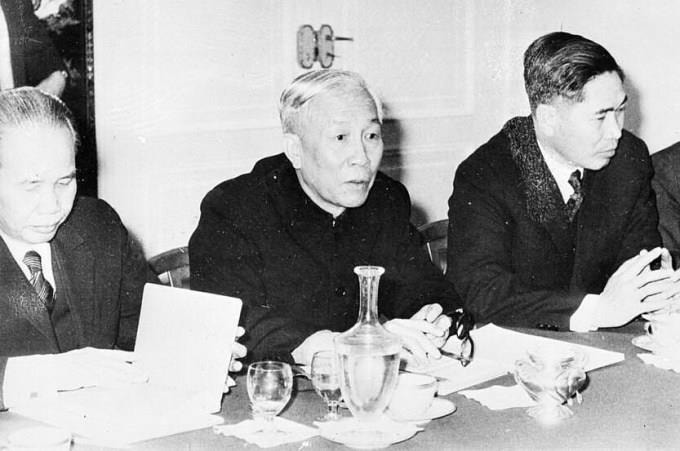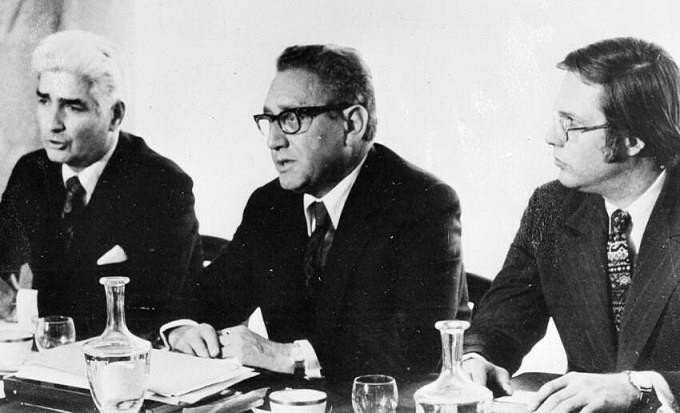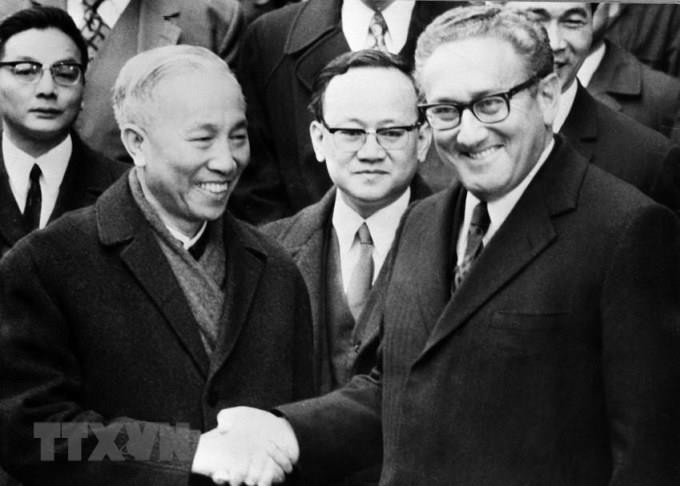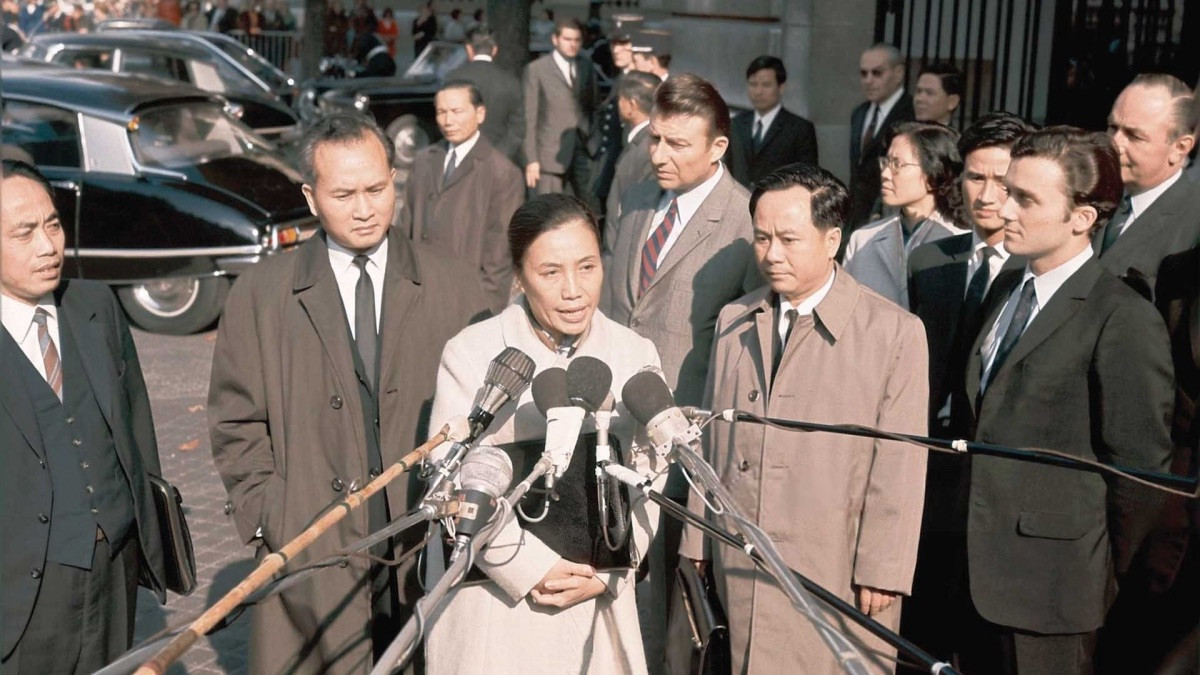The battle of wits between Mr. Le Duc Tho and Kissinger in Paris
In the three years 1970-1972, Mr. Le Duc Tho and Mr. Henry Kissinger went through dozens of intense negotiation sessions in Paris to end the war and restore peace in Vietnam.
The four-party talks in Paris began in 1969, but were deadlocked in public sessions. To resolve the issue, the US and Hanoi arranged a secret channel, with Le Duc Tho and Kissinger as the main figures.
Mr. Le Duc Tho was from Nam Dinh, joined the revolution from a young age, and went through many prisons from Hoa Lo to Son La and Con Dao. During the Tet Offensive in 1968, he joined the Central Office for Southern Vietnam. Later, President Ho Chi Minh appointed him as a special advisor to the Head of the Diplomatic Delegation Xuan Thuy at the Paris negotiations. At that time, he was 57 years old and a member of the Politburo.
In his memoirs, Kissinger described Le Duc Tho as having gray hair, majestic, always wearing a gray suit or a maroon, with large, bright eyes. Tho was very calm, his attitude "could not be faulted, except for one or two times".
Kissinger is the White House's Special National Security Advisor, a former Harvard University professor, a talented diplomat with deep knowledge of Vietnam.
First meeting
Mr. Le Duc Tho and Mr. Kissinger met for the first time on February 21, 1970, at 11 Darthé Street, Choisy-le-roi, Paris. Mr. Xuan Thuy welcomed Kissinger and led him into a small living room. "This was a historic moment. Two people completely different in terms of social origin, nature, and political ideals met and argued fiercely for three years to find a solution to the Vietnam problem," diplomat Luu Van Loi, Mr. Le Duc Tho's secretary, recounted in the bookNegotiations between Le Duc Tho and Kissinger in Paris.
Apologizing for being late and requesting to keep the meeting secret, Mr. Kissinger affirmed that the US wanted to negotiate in good faith and seriously, but noted that the situation in the US was more favorable for Nixon, the situation in the South was more difficult for Hanoi. Hanoi also no longer had the support of many countries as before. The US was not rigid and wanted to end the war in reality, not in theory.
Kissinger stressed that progress in negotiations depended on not increasing violence in the South. After the war ended, the US would help Vietnam reform and rebuild the country and "would never be a threat to Vietnam's independence". Before concluding, Kissinger apologized for speaking too long, but added that "Harvard professors always speak for 55 minutes".
 |
Advisor Le Duc Tho (center) at the negotiation with Henry Kissinger, January 13, 1973. Photo:VNA |
On the same afternoon, Mr. Le Duc Tho said Kissinger had not correctly assessed the reality of the battlefield. "That is your right. Over the past 15 years, when assessing the balance of power between the two sides, you were very wrong about us," Mr. Le Duc Tho said, not forgetting to mention that Vietnamization of the war had begun to fail.
The Hanoi delegation's advisor affirmed that no matter what the US did, it would not change the direction of the war. "My people have been deceived many times, if we want to solve the problem, we must be honest," said Mr. Tho. Before concluding his speech, Mr. Tho emphasized: "Between the two paths of peace and war, you should choose one. If you choose the path of peace, we can solve the problem peacefully."
Negotiations deadlocked
In early October 1972, after Hanoi presented the draft of the Paris Agreement, Mr. Le Duc Tho and Mr. Kissinger basically agreed on many terms and estimated the time frame for signing. Kissinger said he would go to Hanoi to sign, Mr. Tho humorously said "maybe I have to parachute", because at that time, to cross the Red River, I had to use a pontoon bridge. But then, the US delayed the implementation and Kissinger did not go to Hanoi as planned.
At the November meeting, Mr. Kissinger tried to ease the atmosphere by inviting Mr. Le Duc Tho to lecture at Harvard University. In response, Mr. Tho read a prepared speech, 5 pages long, stating Hanoi's goodwill and denouncing America's betrayal. "We have been deceived by the Japanese, the French, the Americans, but never as blatantly as this time," Mr. Tho said harshly and asked Kissinger, "You once said it was necessary to understand and trust each other, then you turned it around, how do you think we understand you?"
 |
Henry Kissinger, White House National Security Advisor (center), negotiates with advisor Le Duc Tho in France on January 13, 1973. Photo:VNA |
Kissinger explained that the war had been prolonged, so when he got closer to a solution, he saw complicated problems that he had not thought about. He promised to finish most of the text this week, but he demanded to revise most of the chapters in the agreement, especially those on ceasefire, troop withdrawal, and internal politics in the South.
The US demanded that the name of the Provisional Revolutionary Government of the Republic of South Vietnam be removed from the preamble and other details of the agreement; that all non-Southern forces be withdrawn from the South; and that there be no recognition of two governments, two armies, or two regions in the South. Kissinger also said nothing about the responsibility for healing the wounds of war in Vietnam.
Diplomat Luu Van Loi said that Mr. Le Duc Tho recalled that Nixon had sent a diplomatic note to Hanoi affirming that the agreement was "considered complete" and criticized Kissinger's arguments.
Mr. Tho clearly stated the role of the Provisional Revolutionary Government in the South and in the international arena. For many years, the South has had three regions, controlled by the Saigon government, the Liberation Army, and the disputed region. Kissinger's demand to abolish the regions controlled by the Provisional Revolutionary Government (Liberation Army) is something that the US and Saigon forces have never been able to do. This proposal is absurd.
Mr. Tho rejected the US demand that the Northern troops withdraw from the South. The Vietnamese people have the right to resist invasion and cannot put the withdrawal of the Northern troops on par with the withdrawal of the US troops. "Raising the issue like that is unjustified, against morality, politics, and law," Mr. Tho argued with Kissinger.
Mr. Tho maintained his view that if Hanoi released American prisoners of war, Saigon would release all civilian personnel from the South who were still being held. "Do you see any war in the world between two sides that ended, one side returned the prisoners, and the other side kept them?" Mr. Tho continued to question Kissinger.
Kissinger agreed to some of Le Duc Tho's proposals, but the two sides still had many disputes. Tho once asked directly, "Do you want to negotiate anymore? If the advisor doesn't want to, then we'll stop. If you want to discuss more, then we will discuss, but there must be give and take."
The final round
On December 18, 1972, when Mr. Le Duc Tho had just returned home from Gia Lam airport, American B-52 aircraft began bombing Hanoi, Hai Phong and many other cities. But Nixon's bombing plan to reverse the situation failed, and meetings between Mr. Le Duc Tho and Kissinger resumed in early 1973. This was also the final round between the two men to sign the agreement.
"Advisor Le Duc Tho arrived in Paris amid the glory of the Dien Bien Phu in the air battle," described Mr. Luu Van Loi.
Unlike usual, the Vietnamese delegation did not welcome Kissinger at the gate. Hanoi showed its indifference to the Americans, after 12 days and nights of fire and smoke in the sky of Hanoi. "You used the excuse of interrupted negotiations to bomb North Vietnam when I just got home. Your actions were blatant and brutal. You thought that by doing so you could subdue us, but you were wrong. You made the negotiations difficult, tarnishing America's honor," Mr. Le Duc Tho criticized the US.
Mr. Kissinger explained that Hanoi's negotiation style in late 1972 made Washington think that it wanted to prolong the situation and not solve the problem. When Kissinger asked not to criticize anymore, Mr. Tho replied: "I have restrained myself a lot, but world public opinion, journalists and figures in the US used much more violent words."
 |
Advisor Le Duc Tho and Dr. Henry Kissinger congratulate each other after the initialing ceremony of the Paris Agreement, January 23, 1973. Photo:VNA |
The way to sign the agreement was a technical issue, but it was of interest to the four negotiating parties. Mr. Le Duc Tho asked for two parties to sign and four parties to sign. Kissinger did not agree, proposing three options, but none of them included the name of the Provisional Revolutionary Government of the Republic of South Vietnam.
Then, Kissinger suggested that two sides sign, four sides sign, but in the four-party version, each side signs a separate page and all four pages are combined into the agreement; the signers all write their positions. The two sides agreed like that.
Mr. Le Duc Tho proposed adding a Protocol on compensation. Kissinger said that the US would contribute to healing the wounds of war, but there should be no Protocol when American prisoners of war had not been released and the amount needed to be approved by the National Assembly. Therefore, the two sides would exchange notes and discuss later. Mr. Tho agreed.
On the last day of the meeting on January 13, 1973, Kissinger suggested that the signing ceremony not have a speech and only wish each person outside. It was a solemn day in the US, and even more solemn in Vietnam. "Therefore, we should start with an attitude of reconciliation, generosity, and warmth towards each other," Kissinger said and Mr. Tho agreed.
At the end of the last day of the meeting, the two delegations had dinner together. Mr. Le Duc Tho raised his glass to Kissinger, saying "this is an initial but very important and fundamental result to restore peace in Vietnam". Kissinger replied "by this time peace will return to Indochina, to our two peoples on the day of signing the agreement".
On January 23, 1973, after initialing the Paris Agreement, Kissinger gave a pen to Mr. Le Duc Tho and said, "I give you this pen to remember this historic day forever." Mr. Le Duc Tho gave Kissinger his pen in return, telling him, "You have to keep your word after signing."
After the Paris Agreement on ending the war and restoring peace in Vietnam was signed on January 27, 1973, Mr. Le Duc Tho and Mr. Kissinger were awarded the Nobel Peace Prize. However, Mr. Tho refused to accept it on the grounds that the US had waged an aggressive war in Vietnam. One side invaded, the other side fought against the invaders to liberate their people, and they could not share the Nobel Peace Prize. Moreover, peace had not yet truly existed in Vietnam, and the country was still divided.

50 years of Paris Agreement: The plot to divide Vietnam failed
25/01/2023

